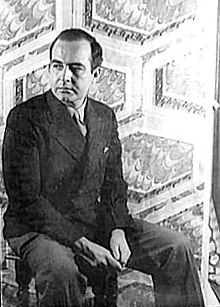
Samuel Barber 1944
Adagio For Strings is one of the most recognizable mournful pieces of classical music. It was composed in 1936 by American Samuel Barber who is also one of the most celebrated composers of the 20th century. He was awarded the Pulitzer Prize for Music twice. Adagio For Strings is arranged for string orchestra from the second movement of his String Quartet, Op. 11. Samuel Barber rejected many arrangements of it, such as with the organ but he did transcribe the piece in 1967 for an eight-part choir, as a setting of the Agnus Dei (“Lamb of God”). Adagio For Strings has featured in many television shows and movies (including Platoon) and was even played at the funerals of Albert Einstein and Princess Grace of Monaco.
Interesting Facts from Wikipedia:
- The recording of the world premiere in 1938, with Arturo Toscanini conducting the NBC Symphony Orchestra (hear the actual recording below) was selected in 2005 for permanent preservation in the National Recording Registry at the United States Library of Congress.
- Adagio for Strings is the final song on the 2010 Peter, Paul and Mary compilation album Peter Paul and Mary, With Symphony Orchestra. Mary Travers had requested that Adagio for Strings be played at her memorial service.
- The Adagio for Strings was one of John F. Kennedy’s favorite pieces of music. Jackie Kennedy arranged a concert the Monday after his death with the National Symphony Orchestra; they played to an empty hall. The concert was broadcast by radio.
- The work is also extremely popular in the electronic dance music genre, notably in trance.
To end this post on a bright note, what piece of music would you like to have played at your funeral if at all?


When I hear this- I think immediately of Platoon- where it was put to great use.
Once – some time ago – I had to organize another teacher’s funeral – so I got the kids in his class to selected the songs. I gave them a hymn book and they selected “God rest ye merry gentlemen”! We didn’t use it! Samuel Barber’s piece would’ve been better!
You didn’t use ‘God rest ye merry gentlemen’? What did you use?
Great Scot! The funeral was over 45 years ago! My memories is not that precise!
But you remembered the song you didn’t use. Ok Bruce haha. And you wish the kids selected Adagio For Strings from the songbook? I think we are going around in circles.
The credits to Platoon. Just heartbreaking. The music literally pulls out your heart. One of the toughest to conduct too…
Yes, it’s used to good effect in that movie. Are you a conductor?
I am. The meter is not only difficult to conduct, the rubato is like mind reading between the podium and the floor. Inhaling between phrases is really the best cue, but you don’t want that inhale to be heard by the recorder. It’s one of the most remarkable pieces of music I’ve ever heard and experienced. It still brings me sadness.
I’m delighted I’m in communication with an actual conductor. I appreciate you specifying why it’s so difficult to conduct. Yes, it’s a remarkable piece of music. There are plenty of mournful pieces of classical music to come in my music library. Thanks so much for contributing to the discussion about Adagio For Strings especially given your musical expertise!
Thank you for bringing it up. Conducting is just dancing in front of a symphony. This one is particularly difficult because there are no mechanical beats or timely expectations. Listen for the phrase endings and resolutions. How does one start the next one? The crescendo into the apex – how much did Barber want us to accelerate? We don’t know. I’m lucky I had many before me perform this… freedom of tempo and freedom to express – it’s a morbid standard, thumbprinted into our world forever, and I couldn’t be any more grateful and moved…
I like your dancing metaphor or may be you are being literal. I understand what you mean about their not being any significant points or beats which to work from. It’s a facet of the piece which many including myself had probably not considered before with respect to bringing it to life. It requires a lot of prior knowledge and intuition on the part of the conductor. It has been fascinating to read about your perspective of the Adagio from the inner sanctum (as it were) and your stirring description how it has left an indelible mark on the world. A real pleasure. Thank you.
Funny how a lot of us mostly recall this from Platoon.
I love this piece also and it’s fascinating to hear your guest Reely Bernie above discuss the actual mechanisms of playing and conducting this music–endings and resolutions, crescendos and acceleration. One could almost think he’s talking about racing a car or something else unrelated to music.
“It’s a morbid standard, thumbprinted into our world forever.”
What a lovely line.
I can’t even think of what music I would want. I’ve mentioned how I love Mahler’s Symphony No. 5. I have a soft spot for the soundtrack of “The Hours,” by Phillip Glass. Maybe I’d go with Moby’s God walking over the face of waters. But in the end, I won’t have a funeral, because I don’t believe in them. 🙂
I scantily remember the movie Platoon. I’m reluctant to admit, I probably saw Charlie Sheen in ‘Hot Shots’ more times (slaps forehead).
To have Reely add his expert opinion about the piece was surreal. I felt like I had a special guest appearance on my blog. Haha. As you imply his technical breakdown about the complexity of composing the Adagio was engrossing.
You have given me some ideas on a few things I can do today while I clean my house: Listen to the soundtrack of The Hours, Mahler’s Symphony No 5 and Moby’s God walking over the face of waters.
In my post about Virginia Woolf’s ‘To the Lighthouse’ (one of favourite books) I presented the excerpt from the movie where Kidman narrates Woolf’s final letter. I still haven’t seen ‘The Hours’. I recently saw her in ‘Dogville’ by Lars Von trier which I recently reviewed and is scheduled to appear here in a week or so.
I probably share to some degree your sentiments regarding funerals, not that I have given the topic much thought!
As usual Stacey you have given me much to ponder and I feel grateful to read your thoughts and opinions regarding the posts.
Thank you, Matthew. It’s a pleasure. Your posts are entertaining and eclectic, so it’s hard for a reader not to get pulled in anyway.
As years went by, Platoon ceased to be a favorite of mine anymore. It lost some of its luster. But Full Metal Jacket stands the test of time, in my opinion. 🙂
I look forward to your Dogville review. I remember that weird movie! I’ll share our favorite line with you after you post the blog….. 🙂
Hey Stacey,
I’m genuinely thrilled you think that about my blog. It means a lot to me. Thank you.
I agree 100% with you about the Full Metal Jacket’s legacy.
Dogville was one of the more unusual and slow movies I’ve seen in some time, but it poses challenging philosophical discussion. I’m looking forward to reading that favourite line of yours.